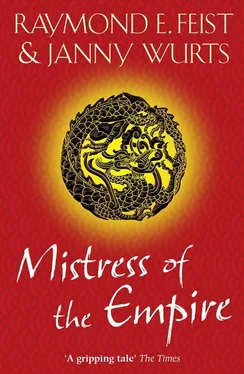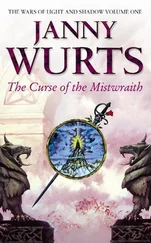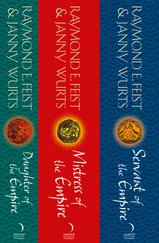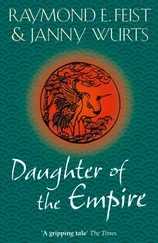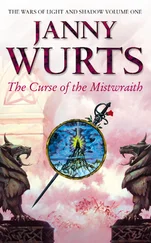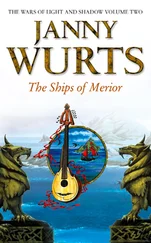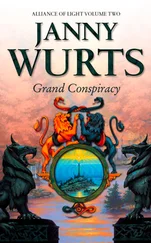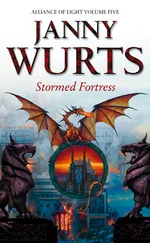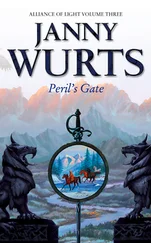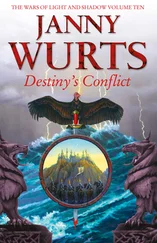Mara closed her eyes, and tried to deny the oil-scented smoke of the death lamps. She did not need reminding that thousands of lives depended upon her, as Ruling Lady of the Acoma; today she had paid for the proof that she did not deserve their trust. She was regent for a growing son no longer. There seemed no heart left in her, and yet she must prepare for a great war, and achieve vengeance to keep family honor, and then, she must produce another heir.
Yet the hope, the future, the enthusiasms, and the dreams she had sacrificed so much for had all gone to dust. She felt numbed, punished beyond caring.
‘My Lord and husband,’ she said hoarsely ‘attend to my advisers, and have them do as you suggest. I have not the heart to make decisions, and the Acoma must make ready for battle.’
Hokanu looked at her with wounded eyes. He had long admired her spirit, and to see her beautiful boldness overcome by grief made his heart ache. He held her close, knowing the depth of her pain. ‘Lady,’ he whispered softly. ‘I will spare you all I can. If you would march upon Jiro of the Anasati, I will stand at the right hand of your Force Commander. But sooner or later, you must put on the mantle of your house. The Acoma name is your charge. Ayaki’s loss must not signify an ending but create a renewal of your line.’
Past speech, beyond rational thought, Mara turned her face into her husband’s shoulder, and for a very long time her tears soaked soundlessly into the rich blue silk of his robe.
• Chapter Two • Confrontation
Jiro frowned.
Though the unadorned robe he wore was light and the portico around the courtyard adjacent to his library was still cool at this early hour, fine sweat beaded his brow. A tray of half-eaten breakfast lay abandoned at his elbow, while he tapped tense fingers on the embroidered cushion he sat on; his eyes unwaveringly studied the game board spread at his knees. He considered the position of each piece singly, and sought to assess the probable outcome of each move. A wrong choice might not seem immediately obvious, but against today’s opponent, the consequences were apt to prove ruinous several moves later. Scholars claimed the game of shah sharpened a man’s instinct for battle and politics, but Jiro, Lord of the Anasati, enjoyed puzzles of the mind over physical contests. He found its intricacies hypnotic for their own sake.
His skills had surpassed those of his father and other teachers at a precociously early age. When he was a boy, his older brother, Halesko, and younger brother, Buntokapi, had often as not pummeled him for the contemptuous ease he displayed in defeating them. Jiro had sought older opponents, and had even contended against the Midkemian traders who visited the Empire more and more often, seeking markets for their otherworld goods. They called the game chess, but the rules were the same. Jiro found few in their ranks to challenge him.
The one man he had never defeated sat opposite him, absently scanning through an array of documents piled meticulously around his knees. Chumaka, First Adviser to the Anasati since Jiro’s father’s time, was a whip-thin, narrow-faced man with a pointed chin and black, impenetrable eyes. He checked the game board in passing, now and again pausing to answer his master’s moves. Rather than being irritated by the absent-minded fashion in which his First Adviser routinely defeated him, Jiro felt pride that such a facile mind served the Anasati.
Chumaka’s gift for anticipating complex politics at times seemed to border on the uncanny. Most of Jiro’s father’s ascendancy in the Game of the Council could be credited to this adviser’s shrewd advice. While Mara of the Acoma had humiliated the Anasati early in her rise to greatness, Chumaka had offered sage counsel that had sheltered family interests from setbacks in the conflict that had followed between the Acoma and the Minwanabi.
Jiro chewed his lip, torn between two moves that offered small gains and another that held promise of long-term strategy. As he debated, his thoughts circled back to the Great Game: the obliteration of House Minwanabi might have proven a cause for celebration, since they had been rivals of the Anasati – save that the victory had been won by the woman Jiro hated foremost among the living. His hostility remained from the moment Lady Mara named her choice of husband, and picked his younger brother, Buntokapi, as her consort over Jiro.
It did not matter that, had his ego not suffered a bruising, Jiro would have been the one to die of the Lady’s machinations, instead of Bunto. Enamored though he was of scholarly thought, the last surviving son of the Anasati line stayed blind to logic on this point. He fed his spite by brooding. That the bitch had cold-heartedly plotted the death of his brother was cause for blood vengeance; never mind that Bunto had been despised by his family, and that he had renounced all ties to Anasati to accept the Lordship of the Acoma. So deep, so icy was Jiro’s hatred that he preferred obstinate blindness to recognition that he had inherited his own Ruling Lordship precisely because Mara had spurned him. Over the years his youthful thirst for retribution had darkened into the abiding obsession of a dangerous, cunning rival.
Jiro glared at the shah board but raised no hand to advance a player. Chumaka noticed this as he riffled through his correspondence. His high brows arched upward. ‘You’re thinking of Mara again.’
Jiro looked nettled.
‘I have warned you,’ Chumaka resumed in his grainy, emotionless voice. ‘Dwelling on your enmity will upset your inner balance and ultimately cost you the game.’
The Lord of the Anasati indicated his contempt by selecting the bolder of the two short-range moves.
‘Ah.’ Chumaka had the ill grace to look delighted as he removed his captured minor player. With his left hand still occupied with papers, he immediately advanced his priest.
The Anasati Lord chewed his lip, vexed; why had his First Adviser done that? Enmeshed in an attempt to fathom the logic behind the move, Jiro barely noticed the messenger who hurried into the chamber.
The arrival bowed to his master. Immediately upon receiving the languid wave that allowed him leave to rise, he passed the sealed packet he carried to Chumaka.
‘Your permission, master?’ Chumaka murmured.
‘The correspondence is coded, is it not?’ Jiro said, not wanting the interruption as he pondered his next move. His hand lingered between pieces, while Chumaka cleared his throat. Jiro took this for affirmation. ‘I thought so,’ he said. ‘Open your dispatches, then. And may the news in them for once dull your concentration for the game.’
Chumaka gave a short bark of laughter. ‘The more scurrilous the gossip, the keener I will play.’ He followed Jiro’s indecision with an amusement that almost, but not quite, approached contempt. Then he flipped over the pouch and used the one thumbnail he left unbitten for the purpose to slit the tie.
As he thumbed through the papers inside, his brows arched. ‘This is most unexpected.’
The Lord of the Anasati’s hand hung in space. He looked up, intrigued by the novelty of his First Adviser’s surprise. ‘What?’
Servant to two generations of Ruling Lords, Chumaka was rarely caught out. He regarded his master, speculation in the depths of his eyes. ‘Pardon, my Lord. I was speaking of this.’ He drew a paper from the pouch. Then, as his peripheral sight took in the piece under Jiro’s poised hand, he added, ‘Your move is anticipated, master.’
Jiro withdrew his hand, caught between irritation and amusement. ‘Anticipated,’ he muttered. He lounged back on his cushions to settle his mind. From this changed vantage, the game board showed a different perspective; a trick picked up from his father at an early age.
Читать дальше
